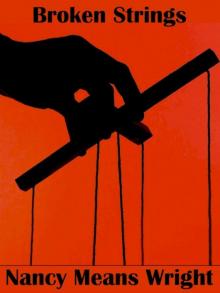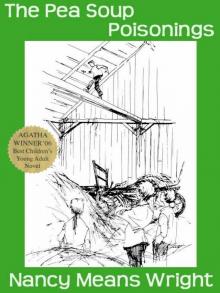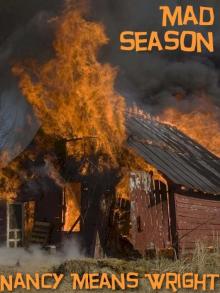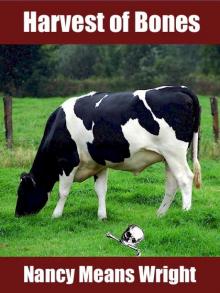- Home
- Nancy Means Wright
Mad Season Page 14
Mad Season Read online
Page 14
“We’ll meet here half-past five,” the lieutenant told the others. “Leave the cars in that parking lot over there.” The way he said it meant, Just the four of us. We don’t need a fifth.
So Colm went back to his motel and downed a Manhattan, he needed it. He’d be at the dealer’s by five, just in case. It was going to be rough, he didn’t have a gun, couldn’t defend himself. What was he doing here, anyway? What if someone was killed? All the dead men he knew were brought to the funeral home by relatives. It was going to be rough, yes. Interesting word, rough. Sounded like ruff: elitist dress, obscuring the ears maybe, suggesting doublespeak, hypocrisy.
What good were words without a gun? No one was going to give a pseudo-detective a gun. He couldn’t shoot one anyway, could he? He hated guns. Jeez, a detective without a gun!
* * * *
Branbury was a small town, the few criminals were housed in the old red brick courthouse—mostly break-ins, now and then a drug bust. Wilder would be out on bail already, Ruth bet; Carol’s new green pickup was pulling out as she arrived. The husband was with her, they walked apart like each was teetering on a separate tightrope. The husband looked mad enough to kill, another reason Ruth wanted to be here alone, to see what she could find out.
Wilder had been picked up on a drug charge, she discovered, not the assault at all, though there was some question about the other; the officer looked meaningfully at her. Still she was shocked: a drug charge. And Emily? Was Emily into drugs? The thought panicked her, she needed to sit down. She barely made the contact room; found Wilder half crouched on a wooden bench, his head in his hands like a melon he could hardly heft.
“Why am I here?” He answered her unspoken question. “Not the cocaine. I made a delivery for my brother, that’s all. Kurt was .. . indisposed. But promised he’d try to quit. I think he means it this time. Does that involve me? I think I was set up, they’ve been watching us, like we’re some—”
He made a noise in his throat. She waited. “But the other—don’t think—look, Ms. Willmarth, I sold them a raffle ticket. Yeah, sure I did, she gave me a dollar. I don’t recall it smelled. I did it for Kurt.” He cleared his throat. “He’s my brother. But sometimes—”
“Sometimes?”
“Sometimes I can’t find him at all. He doesn’t know I’m in the room with him, he’s that far gone. I sense he wouldn’t even know how to be the old Kurt, who the old Kurt was. He says he wants to change. But I don’t know if he can.”
“Even if it means you take the blame for something he did,” Ruth said. And waited.
But the boy turned his face away.
“The fact is you lied to the police.” Ruth was calmer now. She believed him about the drugs, she had to. “You told them you’d never been there, you went back on your story. You were there that night.”
“With Emily! In the car.” His hazel eyes pleaded with her.
She had to think tough. “After you dropped off Emily, too. Your car was still there. Another car stopped. Emily saw. I saw.”
Now she was lying. She hadn’t really seen, but she’d felt, she’d felt something out there. That moon, she could never sleep on a full moon night. She’d gone to the window in the bathroom; she’d seen something in the road, hadn’t she? A car, or merely shadows—who knew? Or was it because Emily had seen a second car?
Was it a lie if it brought out the truth?
He dropped his head back in his hands. “Emily told you,” he said, like he’d been betrayed so often he hardly cared anymore. “Sure, I was there. Dreaming, sure. Can a kid dream?”
“And saw nothing else?” Her voice was softer now. She’d dreamed her way through high school herself, those two years of college. It was marriage, money worries that killed the dream.
The flush crept up his neck, his chin, spread over his cheeks. He looked like he had something to tell her, wanted to tell. She waited.
But the color cooled, the lines went stubborn in the face, like he’d been caged all year, was damned if he’d give in now.
“Nothing. Nothing but the moon. Oh, another car going past, slow, you know the road, nothing more.”
She got up to go, then turned back, he was still slumped on the bench. “Your mother’s worried sick about you, Wilder. It’s hard, having a son—” She stopped, something was filling her throat.
“I know. I know about Vic.” He appeared to be shrinking into his shoes. If she didn’t leave she might run over and embrace him, cry on his bony shoulder. He was just a boy.
She left.
Out in the parking lot she stopped short, her heel caught in a crack of the pavement. What a softie she was. Wilder was hiding something, someone, she knew it, knew it!
She yanked her foot out of the crack and felt something rip. The rubber heel had torn off and now she’d have to stop at the shoe repair shop. There wasn’t time, she had to get back to the cows, her best milker down with ketosis, it was putting her off her feed, she’d have to call the vet.
“Shit,” she said, “Shit. Shit shit shit.”
And felt better when she’d said it.
* * * *
Colm had to admit he was nervous, waiting. Jeez, what an amateur he was. The lieutenant looked at him like he was a girl. “Better stay back then,” he said, a concession to speak to the interloper. “We’ll do the hard stuff. You identify the boy—if Smith brings him.”
He wished now he had a gun. But it was too late. A Colt was coming up the drive. He flattened himself against the wall. The dealer, Petronelli, was nervous, too, he was sweating waterfalls. He might give the whole thing away, they might lose everything. Was anyone else in the car? Was it Vic? It was a policeman’s job to get Vic out—if he was there—while Fat Man was inside the house. But what if there was an accomplice, someone else in the car? Had they thought of that?
Colm could barely see, it was stuffy in here, he could hardly breathe. The plan was for Petronelli to meet the fat man at the door, invite him in. Then the police would close in from outside. If the dealer didn’t give them away. Colm heard the bottle clink down on the table, the guy was fortifying himself.
The door banged. It sounded like an explosion. His head was coming apart. He heard Petronelli yell, “Come in,” he wasn’t going to the door, he was too nervous. He’d give it away for certain.
The door opened. The voice was jovial. “I’m in,” the man said. And Petronelli called from the next room, on cue: “Minute. I got Cairo on the air, gotta sign off. Car’s around back. Beside the green Chevy. Keys inside, you can—”
“I’ll get it then,” said the voice. And the door slammed.
This wasn’t in the plan, to let him leave. The dealer had done them in, the idiot! Colm was sweating, his face was a steam bath. He heard the lieutenant swear. He heard a shout, a lot of shouts. He ran to the back door.
And there was the fat man, running toward the new car. Colm plunged out after him, it was like diving over a cliff. And then crashed. There was a flash of pain, and the air turned blue and then green. And then black.
When he opened his eyes, sat up, sank down again from the pain, they had the guy. There were three men on him: the lieutenant was screaming, they’d almost lost him. Smith had whirled away, he was agile for his size, fired a second wild shot and got the lieutenant in the elbow. The lieutenant was screaming with outrage. He’d aimed his pistol and Fat Man stumbled, fell against the fender of the green Chevy. Beside Colm. Colm stared into the small blue eyes. He couldn’t get up himself, something had struck his ankle. They were a pair.
Colm said, “Where’s Vic? Where’s Vic, you bastard?”
“Who’s Vic?” growled the fat man, and squealed as he was yanked up and onto his feet, his wrists clapped with handcuffs.
Colm got up on one knee, he had to see for himself. The lieutenant was yelling at him, yelling how stupid he was, running out at the man that way, unarmed. He said it served him right if he was shot.
And the world went blank again. The world had lan
ded, solidly, on Colm’s left foot.
Chapter Ten
Ruth went to the Unsworths’ “on business,” she told Sharon, sitting her down by the phone. She wanted to meet Kurt for herself, see what he knew about Vic, watch him with Wilder, who was out on bail—all that Unsworth money! But “watched like some criminal,” his mother had despaired over the phone. And Ruth wanted to see Garth, though how could a fifth grader arrange a kidnapping? No, it was too sophisticated for that.
Besides, she had to get out of the house, she was stir-crazy. Do something, anything, that might remotely lead to Vic.
But how awful to suspect the children of a woman she liked, even admired. Admired, yes, the word surprised her: a woman up from the city, raising sheep, though she hardly knew the first how-to. You had to give her credit.
She was greeted warmly at the door, though she couldn’t return it. She wasn’t ready to be friends, not yet. They came from different planets, didn’t they? The living room was empty of boys, but she heard noise upstairs. It was a Saturday, Kurt was still laid off work. But he was at work the day Vic was taken, Carol had made that clear, he had the alibi. She squeezed her eyes tight, it was hard to think of Vic without her heart flopping over, her stomach throwing up in her throat. When Carol offered a tour of the house before “tea,” Ruth said yes at once. She didn’t want to go, didn’t want to see the boys, yet she had to. But then there were rooms they couldn’t enter, it was like Bluebeard’s castle. Locked rooms—were there bodies inside? Rooms with noises behind the shut doors: scraping, buzzing noises—what were they? Garth’s room was open, though, he was making a model of something, not looking up when they entered, used to his mother’s tours maybe. His nose an inch from the glue he was squeezing between delicate wings. She tried to imagine him with Vic, working on the telescope.
“Garth,” Carol said, “this is Vic’s mother.”
The boy glanced up, did he flush? Looked like he might speak, or protest. And then with a frown he swooped low to his project again, stuck the glue in the wrong place.
“Fuck!”
Here was a new Carol. A swift step and the boy was yanked up to face her, eyes stunned, mouth open to a missing tooth.
“Don’t you say that word again!”
And he was back on the floor, facedown in the furry rug, crying. Ruth wanted to be away, far away. The boy sat up: “See what you did?” He held up two frail pieces of the airplane.
Carol said, breathless, “See why I keep sheep?” Then taking Ruth’s shoulders, pushed her back toward the stairs.
“Same reason I keep cows,” said Ruth, trying to appease, though it wasn’t because of her children, who weren’t like this: stubborn maybe, disobedient sometimes, but never vindictive. This child wasn’t sorry at all, he was spoiled rotten; he needed discipline, probably had little. No wonder Carol preferred sheep. Sheep obeyed without backtalk.
Then on the stairs, one she hadn’t seen before. Looking nothing like Wilder: different coloring, larger features. He nodded, wordlessly, and when Carol introduced them, her voice small like she was afraid of this one:
“Hello,” he mumbled, but didn’t look at her, only stared past her, into the distance. Afterward Ruth remembered the lips, white as parsnips, the stare of the blue, blue eyes. There was something missing here, because of the drugs she supposed. Carol didn’t detain him, she was used to it probably, had long ago given up.
And then Garth’s voice, “Hey! Kurt! Come up here, I need help with my model. I’m outa the right glue. Kurt!”
And Kurt moving slowly up the stairs, hangdog, his back humped like he bore a weight he couldn’t lift; no good-bye, no “nice to have met you,” just a slow, labored exit. Would he help Garth with the model?
When they sat down again in the kitchen, Carol made a valiant effort to entertain: tea, homemade biscuits this time. “I add bits of dried pineapple, you see. Wilder loves them, he’s my bake boy. Has he used your stove, too?”
Ruth spread her hands. She couldn’t remember things these days, not even what Sharon had made for supper the night before.
“He wants to see Emily, I know that. Probably he’s, well, afraid. Do you think that’s it?”
The woman was ingenuous, Ruth thought, the wrong woman for these three sons. Too bad one couldn’t match parents to sons, after they’d grown up a little.
Ruth said, “There was some rift, even before the police got to him.” She didn’t want to get into it, didn’t want to betray Emily again. “I don’t know, except that Emily’s unhappy.”
That much she could say for Emily’s sake, knowing it would get back to Wilder; he should know he’d made Emily unhappy. Though it might be best if they stopped seeing each other, wouldn’t it? But she couldn’t say that to Carol, could she?
Ruth wondered about the husband she’d seen only that one time by the courthouse: gray-brown hair going bald, inaccessible, made Emily “uncomfortable,” she said. Emily, the romantic, maintained he was something of an autocrat. She didn’t think the parents got along.
“Kurt was George’s son, by his first marriage. “Wilder and Garth are mine.” Carol looked like she wanted to say more but didn’t know if she should. Ruth waited.
And here was Wilder, coming in the back door, flushing to see Ruth; her throat tightened. But when his mother scolded him for the mud he’d brought in, he carefully removed his shoes. He was carrying a bag of groceries, as though, like Kurt’s shoulders, it weighed a thousand pounds.
“I hope you got something for yourself,” Carol said, and he said, “Yup,” and they both smiled a little.
Was this young man a killer? It didn’t seem so, yet he’d lied. Ruth had to remember that.
The boy dropped the bag on the counter, began unloading potatoes, mayonnaise, bread. He held up a half gallon of Ben and Jerry’s. “Heath bar crunch.” I need to indulge myself. Want some?”
Carol shook her head. “Watching my diet. Ruth?”
“No, thanks, I make my own. Plain old vanilla.”
“I’ve sampled it,” Wilder said. “With maple syrup, not bad.” He started out of the room, turned back.
“Ms. Willmarth? Is there any news about Vic? I wish I could help.”
Carol went to Wilder, hugged him. Was this planned? Had she told Wilder to say that?
Was Wilder laughing or crying? Ruth squeezed her tea bag, set it beside the cup. It was time to go, leave mother and son, their arms around each other now, though Wilder was already breaking away. It hurt to see them, made her think of Vic. And what had she accomplished? What had she learned?
Nothing, she answered herself. She was nowhere. She’d been thrown in quicksand, was sinking down, and down. She thought of Willy drowning in the creek. For the first time she knew his panic.
* * * *
Colm was back home in the local hospital. He was a bird with a busted wing, his leg was trussed to the knee like a hockey stick. He’d asked his father to call Ruth, he wanted to tell her himself, before the police got to her, to say it wasn’t the fat man who had Vic. It wasn’t fair to keep her hopes up. They’d grilled the fellow in Ann Arbor, could prove only an illegal weapon, they were sending him back to Vermont. There was no Vic.
Then who, she’d want to know, who did have him? And he’d have to shake his head like a kid in school who couldn’t answer the question, who didn’t even know what the question was.
His mind kept coming back to Pete, but he couldn’t push that, she’d think he had an ulterior motive (did he?). There’d been no ransom call; Pete was still a possibility. The police hadn’t ruled him out.
“A visitor,” the nurse said. “Are you up for it?”
He didn’t feel ready, but it might be Ruth. His heart was doing screwy things in his chest, it wanted to get out. One more day here and he was leaving. There were things to do, like seeing the man Smith for himself, he had his own questions to ask. He had crutches, he could get around. The Detroit surgeon had done a decent job on him. He didn’t want to think of
the cost: he had no health insurance—one more thing out of whack in this country. What could even a president do? Congress? All those interest groups. Lousy politics!
He hiked himself up on the side of the bed, he wasn’t going to see her on his rear end like this, a man back from a failed mission, the abductor still loose, the boy in limbo.
The ankle hurt like hell, the bullet had split bone, he was taped up like a Christmas package ready for the mail.
And knocked flat by the perfume.
“I heard from your father,” she said in her high sweet voice. “We were supposed to meet for that supper, remember? I didn’t know you’d gone away. He said you were hurt, I was worried. I baked you some cookies, gingerbread.”
He felt trapped in her scent, like she’d sprayed something lethal into his neck. “Leave the door open,” he said. “They don’t like it closed.”
But Bertha was already on him, door shut, thrusting out a package wrapped in foil.
He didn’t need cookies, he needed a drink. “Got any Guckenheimer?” he asked, but she just tittered.
“Your leg, Colm, what happened? What were you doing that you got shot? Shot!” She zeroed in on the bandaged leg like it was the feast of Christ, a holy communion between herself and God. Her permed orangy-red hair (did he remember it that color?) wriggled out of its careful confines.
“I was in Ann Arbor, looking for Vic. You know about Vic.”
She was quiet a minute. “Ann Arbor? What would Vic be doing in Ann Arbor?”
“Nothing. He wasn’t,” he said, pulling himself up from the bed. He had to get to the chair, he had a helpless feeling, like this woman was about to bake him into a cookie. He didn’t want to go into it. It was none of Bertha’s business.
Halfway to the chair he stumbled, he didn’t have his crutch. She grabbed him like a hot pan, hustled him into a chair.
“Poor kid, you need someone to help. How you going to get to your appointments? I’m not doing anything now, ‘cept church work, you know, I have time. Too much.” She gave a nervous laugh.
“I’m fine,” he said firmly. “I don’t need help. Look, Bertha, I’ve got someone coming. I can’t talk anymore right now. Maybe later.”

 Stolen Honey
Stolen Honey Broken Strings
Broken Strings The Pea Soup Poisonings
The Pea Soup Poisonings Mad Season
Mad Season Poison Apples
Poison Apples Harvest of Bones
Harvest of Bones